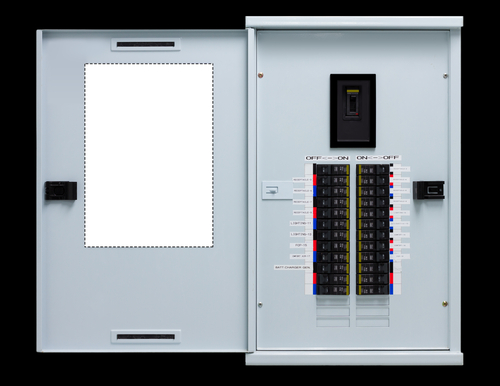
Before you jet off on a vacation, there’s plenty to do to get yourself – and your home – ready for a trip. Aside from packing your suitcase, you probably plan on running a few errands, picking up your mail, and turning off all of the lights to prepare your house for your time away. You want to make sure things run as efficiently as possible while you’re gone, so that no energy is wasted while the house isn’t in use. If you’re leaving for an extended period of time, you might wonder whether you should shut off your circuit breaker, as well.
Before the vacation fun begins, consider these points to decide whether it’s worth it to shut off your circuit breaker before your next trip.
What Happens When the Circuit Breaker is Off?
A circuit breaker takes a little damage whenever you turn it off and on again. This means that while shutting it off once in a while isn’t an issue, repeatedly flipping the switch can harm it and cause an electrical hazard. If you’re planning a longer trip, or leaving a vacation home for the season, it makes more sense to shut off the breaker. But if you turn it off for frequent and short vacations, you’ll only do more damage to the breaker.
One of the major appliances connected to your circuit breaker is your water heater. Since it’s probably in an inconvenient place, such as the basement or the attic, most people access it via the circuit breaker – because they’d rather flick a switch in an open place than try to access the heater itself. Unfortunately, this isn’t always the best method.
Shutting off the circuit breaker leaves your water heater vulnerable to fluctuating temperatures, which can damage the heater. Metal shrinks when it’s cold, and expands with heat. Over time, this expansion and contraction can make the fittings on the heater permanently loose, or too tight. In colder climates, shutting off the water heater can also cause the tank and pipes to freeze.
Be sure to carefully consider any other appliances connected to your circuit breaker before shutting it off. If you disconnect the sump pump keeping your basement dry, for instance, you risk water damage to your home.
How to Reduce Electricity Use
Many people believe that shutting off the circuit breaker is an effective way to save on electricity when they go on vacation. The problem with this method is that once you return home, you’ll turn the circuit breaker back on, which causes a large surge in energy that can essentially cancel out any savings while you were gone. There are more efficient, and less risky ways to reduce your home’s energy usage while you’re away.
Lower Your Water Heater Temperature
Instead of using the circuit breaker to shut off power to your water heater, consider having an electrician install a dedicated switch for the heater. If you can turn off the water heater without affecting the circuit breaker, you avoid losing electricity to your heater, or accidentally shutting off other appliances. You can also use pipe insulation and heater wraps to make your unit more insulated and efficient. Many water heater systems have a dial that allows you to set the temperature of the water. Put the temperature on a lower setting before you leave, to reduce energy usage – some systems even have a dedicated “vacation” setting to help you save electricity.
Unplug Big Appliances
Consider unplugging larger appliances, such as refrigerators and televisions, before your trip. Even when they aren’t in use, some appliances use electricity to power clocks and other functions if they are plugged into an outlet. Your refrigerator is a heavy electricity hog; if you’ll be gone longer than a month, it’s a good idea to clean out all of the food, unplug the fridge, and leave its doors open while you’re gone. For a shorter trip, where you can’t unplug the refrigerator entirely, you can at least turn off the ice maker to save energy and reduce the risk of leaks.
Of course, necessary appliances, such as your sump pump, should remain plugged in to keep your home safe.
Adjust Your Thermostat
Another good way to save energy, as long as items in your home won’t be damaged, is to adjust your thermostat before you leave. Setting it between 50 and 60 degrees Fahrenheit during cold weather will keep your pipes from freezing, and use less electricity than keeping your home continually heated. In warmer weather, keeping the thermostat at 85 degrees Fahrenheit prevents the air conditioner from working too hard while you’re away.
When In Doubt, Leave the Breaker On
When you go away on a trip, it may feel like you should simply shut everything off to reduce your electricity usage to zero – after all, you won’t be there to use any of it, right? Part of being a responsible homeowner is thinking about your home’s maintenance and safety in both the present and the future. While shutting off the circuit breaker may seem like an easy way to cut your electric bill during your vacation, it can actually cause you more trouble than good in the long run. Your circuit breaker is often connected to large and essential appliances, like your sump pump, and it plays a huge role in maintaining your house even while you’re not there. In the case of extremely long trips, it may make sense to turn the breaker off, but for most vacations, it’s better to leave it on. Alternative methods for reducing electricity use, like shutting off appliances and being vigilant about your thermostat, will allow you to save money, be more eco-friendly, and reduce the risk of damage to your home.

 FREE Live Music and Family Fun at Allied Gardens First Fridays The next Allied Gardens First Fridays Summer Concert in the Park is just around the corner. Grab your lawn chairs, bring a picnic, and get ready to meet your
FREE Live Music and Family Fun at Allied Gardens First Fridays The next Allied Gardens First Fridays Summer Concert in the Park is just around the corner. Grab your lawn chairs, bring a picnic, and get ready to meet your  Ideal Plumbing Heating Air Electrical Named Winner of 2023 Better Business Bureau Torch Awards for Ethics in San Diego (San Diego, CA – September 15, 2023) Better Business Bureau Serving the Pacific Southwest (BBB) has named Ideal Plumbing Heating
Ideal Plumbing Heating Air Electrical Named Winner of 2023 Better Business Bureau Torch Awards for Ethics in San Diego (San Diego, CA – September 15, 2023) Better Business Bureau Serving the Pacific Southwest (BBB) has named Ideal Plumbing Heating